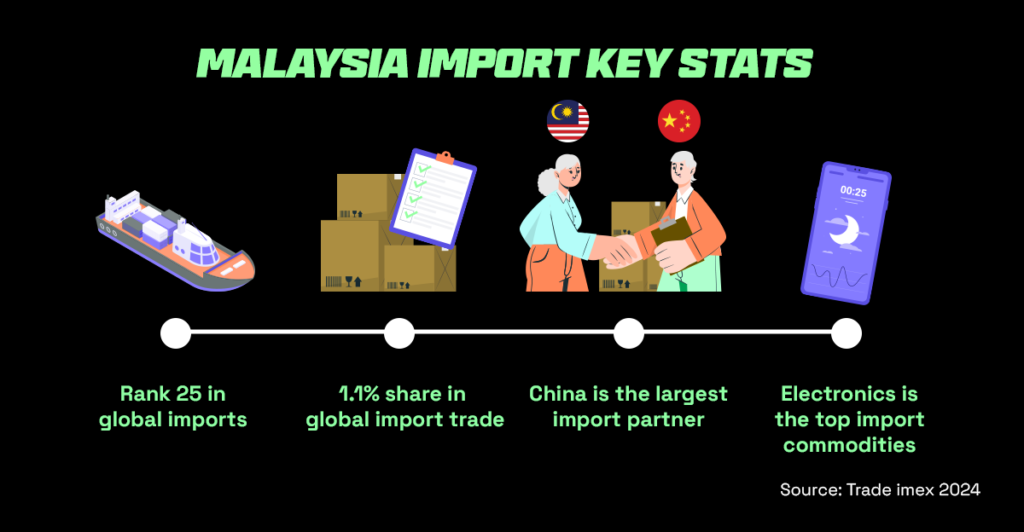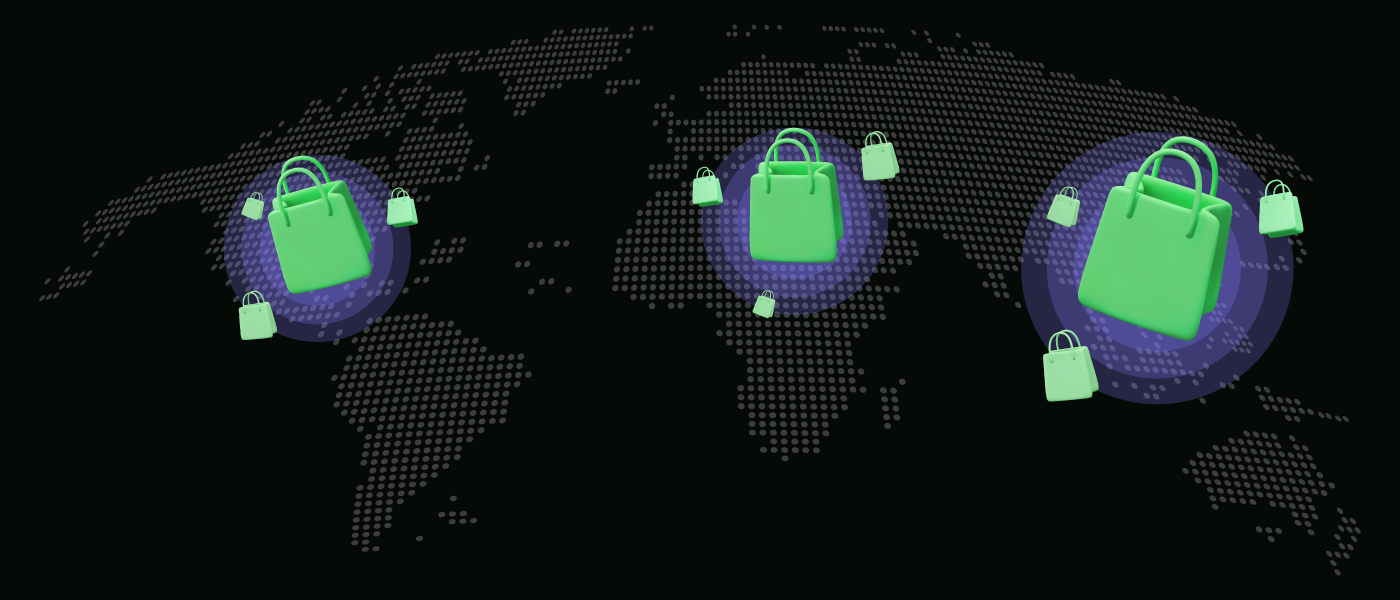
Malaysia imports accounted for US $265.9 billion in 2023, ranking it 25th in the world for import volume. As one of Southeast Asia’s most dynamic economies, Malaysia plays a significant role in global trade. The top products imported into Malaysia include electronics, plastic, pearls, precious stones, cereals, pharmaceutical products, confectionery, and furniture. These items support domestic manufacturing, retail, and consumer demand nationwide. If you are an e-commerce seller looking to source products from manufacturers in other countries, it becomes important to understand the import process.
Malaysia’s main import partners include China, Singapore, the USA, Japan, Saudi Arabia, Indonesia, and South Korea. China, in particular, is Malaysia’s largest import partner, providing a wide range of products, from electronics to machinery, essential for local manufacturing. In this blog, we’ll go over the essential steps of the Malaysia import process and provide a clearer understanding of what businesses need to successfully import into Malaysia.
Who can apply for Malaysia import license?
In Malaysia, the application for an import permit is essential for various entities looking to bring goods into the country. Here’s a detailed overview of who can apply:
- Registered Companies: Both local and foreign companies with a registered office in Malaysia can apply for a Malaysia import permit. This includes businesses that are duly registered with the Companies Commission of Malaysia.
- Individuals: Malaysian citizens aged 18 years or older with a valid Malaysian passport are eligible to apply. This applies to those importing goods for personal use or for commercial purposes.
- Foreign Companies: Foreign entities without a registered Malaysian office can also apply, provided they appoint a local agent to represent them in the application process. Locad offers IOR (Importer of Record) services to help foreign companies import into Malaysia.
- Government Agencies: Various government bodies, including ministries and local authorities, can apply for import licenses as well.
Applicants who are applying for a Malaysia import license should be above the age of 18 with no criminal records. They should have the financial ability to import goods and must complete all the required documentation. Import permits ensure that all imported goods comply with Malaysia’s regulations and standards. It helps reduce delays and potential legal issues related to non-compliance.
How to apply for a Malaysia import permit

The ePermit system simplifies the process of obtaining a Malaysia import permit. It’s a web-based application that eliminates manual procedures, allowing online traders to apply for permits. In this system, you can use a single link to obtain clearance from the Permit Issuing Agency (PIA) and Malaysia’s Customs office. Here’s a step-by-step guide to help you navigate the process:
Step 1: Register for ePermit Access
Before applying for an import permit, you must register on the ePermit system. Visit the official platform managed by the Ministry of International Trade and Industry (MITI) to create your account. You must provide your business details, including a valid company registration number.
Step 2: Submit Your Application Online
Once registered, log in to the ePermit portal to complete and submit your import permit application. Ensure you include all required details, such as product specifications, import quantities, and supporting documents like invoices.
Step 3: Permit Validation by Customs
Once approved, your Malaysia import permit will be electronically sent to Malaysian Customs. This ensures a smooth validation and declaration process during importation, eliminating the need for manual paperwork.
Benefits of the ePermit System
The ePermit system provides a faster, paperless, and more efficient alternative to the traditional process. It has significantly eased the process of obtaining an import permit. Key advantages include:
- 24/7 access to submit applications
- Real-time tracking and monitoring of permit status
- Significant cost and time savings for businesses
- Reduced human intervention, minimizing errors and improving transparency
Step-by-Step Guide to the Malaysia Import Process

The Malaysia import process involves several steps that require coordination between importers, forwarding agents, shipping companies, and customs authorities. Here’s a detailed walkthrough of the process to ensure a smooth import experience:
- Receive Shipping Advice: The buyer/importer receives shipping advice from the overseas exporter, providing essential details about the shipment.
- Obtain Shipping Documents: The buyer/importer receives key shipping documents from the overseas exporter, including the bill of lading and the commercial invoice. If a Letter of Credit is involved, the buyer’s bank notifies them when the documents arrive from the exporter’s bank.
- Arrival Notice from Carrier/Shipping Agent: The carrier or shipping agent issues an arrival notice detailing the vessel’s schedule and the payable shipping charges.
- Simultaneously, a Status List is submitted to the port terminal for operational planning.
- A cargo manifest is sent to Customs for matching against import declarations.
- Issue Forwarding Instructions: The importer provides forwarding instructions and shipping documents to their appointed forwarding agent. In addition, they inform the manufacturing plant or warehouse of the shipment’s expected arrival.
- Customs Import Declaration: The forwarding agent electronically submits the import declaration to Customs using specialized software. Duties and taxes (if any) are paid via electronic transfer.
- If an OGA (other government agency) approval is required, the agent submits the necessary permits and documents for processing and inspection. Once approved, the status is updated in the Customs SMK system.
- Customs release: Upon clearance approval, Customs issues a Release Status to the port terminal, allowing the terminal to release the shipment to the forwarding agent’s designated haulage company.
- Delivery Order and Gate Pass: Forwarding Agent checks on the ETA or vessel with the carrier/shipping agent.
- The forwarding agent exchanges the original bill of lading for an electronic delivery order from the carrier/shipping agent. Any shipping charges payable shall be undertaken by the forwarding agent. The carrier/shipping agent submits the electronic Delivery Order to the Port Terminal.
- The agent applies for a gate pass, which is issued once Customs releases the container’s hold status.
- Arrange Transport: The forwarding agent issues a transport order to the haulage company to pick up the container from the Terminal for delivery to the Importer/Buyer. At the same time, a copy of the delivery order and the gate pass are also submitted, as these documents require proof of authorization for pickup.
- Transport Order Processing: The haulage company reviews the transport order and checks truck availability for the specified delivery date before confirming the order.
- An electronic notification is sent to the carrier or shipping agent once the container leaves the terminal gate.
- Container Delivery: As stated in the transport order, the haulage company delivers the container to the manufacturing plant or logistics warehouse.
- Unloading Notification: The manufacturing plant or warehouse notifies the buyer/importer (or forwarding agent) that the goods have been unloaded and requests the empty container to be returned to the carrier’s designated depot.
- Return Request: The importer informs the forwarding agent to arrange for the empty container’s return. The forwarding agent instructs the haulage company to return the empty container to the nominated depot.
- The haulage company picks up the empty container for return. Then, The empty container is returned to the carrier’s designated depot.
- Confirmation of Return: Once the empty container is returned to the depot, an electronic confirmation message is sent to the carrier or shipping agent. Next, the haulage company submits the Proof of Delivery (POD) to the forwarding agent.
- Final Billing: The forwarding agent prepares a bill of services for submission to the importer, including disbursements and professional fees. All original shipping documents are returned to the importer.
When importing into Malaysia independently, businesses face the challenge of managing multiple partners for freight forwarding, customs clearance, and delivery. This fragmented approach can lead to higher costs, delays, and complexities.
In contrast, partnering with Locad simplifies the entire process. Sellers can seamlessly manage cross-border operations with Locad’s presence in Malaysia and neighboring countries like Singapore, the Philippines, China, Indonesia, the GCC region, Australia, and the United States. This eliminates the need to find separate partners in each region. Locad’s integrated logistics platform also provides Importer of Record (IOR) and Seller of Record (SOR) services, ensuring regulatory compliance while easing the burden of documentation and tax responsibilities.
Malaysia import tax and tariffs
The Malaysia import process involves navigating various taxes and tariffs, which depend on the type, value, and purpose of goods. Understanding these rules is crucial to managing costs effectively. Here’s a detailed overview:
Scope and Rates
Import duties in Malaysia are generally imposed on an ad valorem basis (percentage of the goods’ value), with rates ranging from 0% to 60%. Some goods, such as raw materials, machinery, essential foodstuffs, and pharmaceuticals, are either non-dutiable or subject to minimal duties.
Tariff Rate Quota (TRQ)
TRQs apply to specific agricultural products, such as chicken, milk and cream, hen eggs, and cabbages. The tariff rate depends on the import volume:
- Lower tariffs for imports within the quota.
- Higher tariffs for imports exceeding the quota.
Quota levels are managed by relevant government agencies.
Valuation of Goods
The value of goods used to determine import duties aligns with World Trade Organisation principles of customs valuation, ensuring consistency and fairness.
Duty Exemptions
Certain goods and manufacturers are eligible for import duty exemptions, provided they meet prescribed conditions. Key examples include:
- Raw materials and components used in manufacturing for export and local markets.
- Machinery and equipment directly involved in manufacturing processes.
- Aerospace MRO activities, including machinery, tools, and consumables endorsed by the Malaysia Investment Development Authority (MIDA).
- Nicotine gum and patches for Nicotine Replacement Therapy (NRT) are exempted from duties until March 31, 2026.
- From January 1, 2024, qualified manufacturers can also claim exemptions on the import and local purchase of manufacturing aids based on the industry type and goods category.
List of prohibited / restricted Malaysia imports
Malaysia imposes import restrictions on certain goods to protect local industries, ensure public safety, and maintain security. Importing these items requires a valid license or permit from the relevant authorities. Below are examples of goods subject to restrictions under Malaysia import regulations:
- Certain food products (such as rice), medical devices, cooking appliances, pharmaceuticals and cosmetics
- Certain electrical-operated machinery
- Motor vehicles for the transport of persons, goods, or materials
- Used televisions, including video or visual displays with a TV tuner, used air conditioners, used personal computers, and used mobile phones.
- Billets of iron or steel
- Alloy steel and high-carbon steel
- Stranded wire, cables, cordage, ropes, plaited bands, and the like of aluminum wire
- Natural or synthetic rubber insulated or plastics insulated electric wire, cable, bars, strip, etc.
- Heavy machineries
- Petroleum
- Rags, plastics, papers, or filters contaminated with scheduled wastes
- Chlorofluorocarbons (CFCs) and Hydrofluorocarbons (HFCs)
- Telecommunications equipment
- Tobacco products, alcoholic beverages
- Radioactive/nuclear materials / prescribed substances
- Arms and ammunition
- Motor vehicles parts
- Waste and scrap of paper, paperboard, and metal
In addition to these, some products are absolutely prohibited according to Malaysia import rules. These include any product that contradicts Malaysia’s religious beliefs and Islamic culture.
Locad Can Help You Simplify the Malaysia Import Process for Your Online Business

The Malaysia import process can be complex, involving multiple steps like freight forwarding, customs clearance, and final delivery. Locad’s cross-border service streamlines this process, covering everything from export formalities to last-mile delivery.
Freight Forwarding from Supplier’s Warehouse
Locad handles freight forwarding right from the supplier’s drop-off at the origin warehouse, offering both air and sea freight options. This ensures efficient transportation tailored to your business needs.
Export and Import Clearances
Locad takes care of all required export clearance in the origin country and import clearance upon arrival in Malaysia. If you’re importing from the Philippines, Singapore, China, the GCC region, the USA, or Australia—countries where Locad operates—we simplify the process by managing every aspect of the shipment from start to finish.
In the origin country, Locad oversees the export formalities, including documentation, customs clearance, and compliance with local regulations. With our Importer of Record (IOR) services, we ensure efficient customs clearance upon the shipment’s arrival in Malaysia. This includes handling duties, taxes, and necessary approvals from local authorities.
By leveraging Locad’s presence in both the exporting and importing regions, businesses eliminate the need to coordinate with multiple partners across borders. Locad provides a unified solution that manages end-to-end logistics, ensuring that shipments comply with regulations, move efficiently across borders, and reach Malaysia without delays or complications. This end-to-end approach significantly reduces the operational burden on businesses, allowing them to focus on scaling their operations.
Destination Handling and Warehouse Storage
After clearing customs, goods are moved to a destination warehouse in Malaysia. Locad provides storage in local warehouses and offers continued handling services from the port to the warehouse. We manage every step of the process, from coordinating transportation from the port to ensuring your inventory is stored under optimal conditions.
Last-Mile Delivery
Locad’s distributed warehouse network ensures storage close to customers, reducing delivery times and costs. For last-mile delivery, Locad leverages partnerships with 20+ national and international carriers. The system suggests the most cost-effective carrier based on location, package size, and destination. This enables fast and reliable final delivery.
Conclusion
Applying for a Malaysia import permit and managing the import process can seem complicated, but with the right support, it can be much easier. The ePermit system simplifies permit applications, making the process faster and more efficient for businesses.
Still, importing successfully involves more than just getting an import permit. It requires careful handling of logistics, customs, and delivery. By working with a reliable logistics partner like Locad, businesses can streamline every step, from exporting goods to last-mile delivery. With Locad’s end-to-end services in Malaysia and other key regions, you can save time, reduce hassle, and focus on growing your business.











